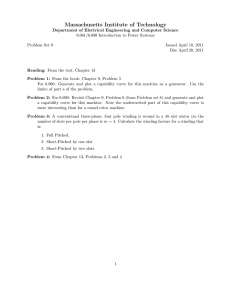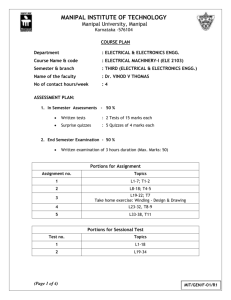Transformer
advertisement
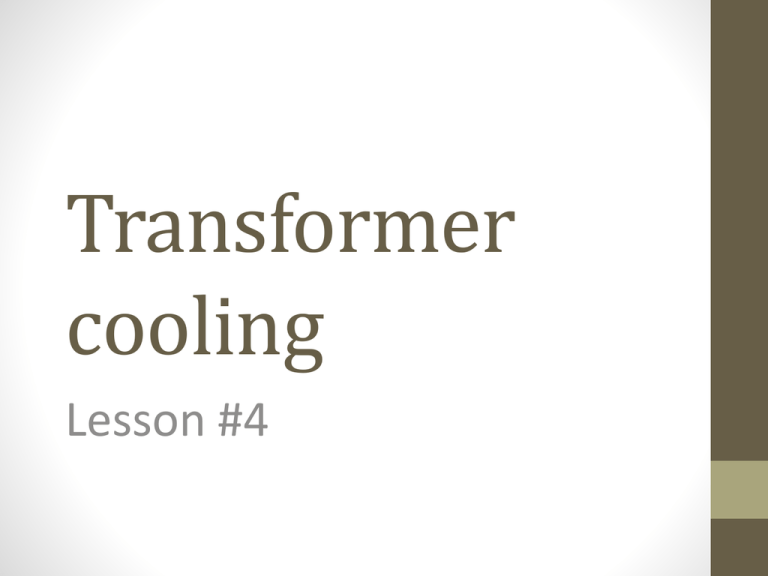
Transformer cooling Lesson #4 When The Cooling is Not Functioning 2 Cooling The Life of A transformer Correct Maintenance will Extend Transformer Life Anclote generating Plant Transformer - Components Liquid Insulation - Oil Provide dielectric strength/medium Provide a cooling medium Protects the paper Use as a diagnostic tool to monitor the condition of the paper Witches Brew • Paper + H2O + O2 + Heat = Oil sludge & degraded paper Cooling System Designations (Liquid Immersed) • First letter: • O for insulating liquid with fire point below 300ºC • K for insulating liquid with fire point above 300ºC • L for insulating liquid with no measurable fire point • Second letter: • N for natural thermosyphon flow • F for forced oil circulation • D for directed oil flow • Third letter: • A for air • W for water • Fourth letter: • N for natural convection • F for forced circulation Cooling system • Types of cooling • Self cooled (OA), no fans or pumps • Forced air (FA), cooling fans • Forced oil/Forced air (FOA), fans and pumps • Example • 30/40/50 MVA, OA/FA/FA • 300 MVA, FOA, no self-cooled rating Cooling System • • • • • • • New Designation ONAN ONAF ONAN/ONAF/ONAF ONAN/ONAF/OFAF ONAN/ODAF ONAN/ODAF/ODAF OFAF or ODAF • • • • • • • Old Designation OA FA OA/FA/FA OA/FA/FOA OA/FOA OA/FOA/FOA FOA Cooling Designations ONAN = oil natural air natural OA = Oil to air ONAF = oil natural air forced ONAN/ONAF/ONAF OA/FA/FA ONAN/ONAF/OFAF FA = Forced air (one stage of fans) (two stages of fans) OA/FA/FOA (two stages of fans one stage of pumps ONAN/ODAF (oil directed) ONAN/ODAF/ODAF OA/FOA/FOA (oil directed two stages of pumps) OFAF or ODAF FOA (one stage of forced oil and air) Temperature Measurements • Transformers have three temperature measurements • Top oil temperature • Winding temperature • Winding temperature rise rating Top Oil Temperature • Top oil temperature is a direct measurement of the temperature of the oil near the top of the tank where the oil will be the hottest. • It is an actual measurement made with a gauge. Winding Temperature • Winding temperature is not an actual measurement of winding temperature. • It is an indirect indication of the hottest spot in the winding based on design calculations. • Winding temperature is a direct measurement of the temperature of the oil near the top of the tank pulse the additional heat provided by an electric heater. • The heater is powered by current from the secondary of a Hot Spot current transformer. • The hot spot CT provides current to the heater based on transformer load. Winding Temperature • CT secondary windings are always rated 5 amps with the exception of the HOT SPOT CT. • The hot spot CT will usually have an odd ratio chosen by the designer to supply the right amount of power to the heater to simulate the calculated hottest spot in the winding. • Transformers usually have only one winding thermometer but large multi-winding transformers may have several. Basic Winding Temp. Circuit Electric heater Hot Spot CT Hot Oil Gauge Bulb Tank Wall Transformer Load Current Winding Temp Gauge Face More Complex Winding Temp. Circuit Electric heater CT Shorting SW. Hot Spot CT Hot Oil Gauge Bulb Tank Wall Transformer Load Current Winding Temp Gauge Face Auto Transformer For Adjusting Heater Current Winding Temperature Drawing Winding Temperature • Newer transformers with electronic temperature gauges may not use a bulb in the oil at all for winding temperature. • Winding Temperature calculations can be made using the output from a standard 5 amp CT secondary. Temperature Rise • Temperature rise is a value found on the nameplate related to a specific transformer capacity. • Temperature rise is the average temperature of the winding. • It is based on the resistance change of the winding measured before and after a heat run in the factory. • It is a guarantee by the manufacturer that the transformer can carry a specific load without exceeding the given temperature rise (temperature pulse ambient air temperature). • The maximum air temperature used as a reference is 40°c (104°f ). Temperature Rise • Example: • MVA 15/20/25 Cont. Temp. Rise 55°c • Air temp. 20°c load 25 MVA gauge reads ≤ 75°c • Air temp. 40°c load 25 MVA gauge reads ≤ 95°c • MVA 16.8/22.4/28 Cont. Temp. Rise 65°c • Air temp. 20°c load 28 MVA gauge reads ≤ 85°c • Air temp. 40°c load 28 MVA gauge reads ≤ 105°c Heat Transfer Equipment • Radiators, For ONAN And ONAF Ratings • Air/Oil Coolers, For ONAF And ODAF Ratings • Air/Water Coolers, For ONAF And ODAF Ratings • Fans • Pumps, One Should Be Cognizant Of Oil Flow Rates And The Effect On Static Electrification • Selection Of Equipment Can Be Based On Maintenance Performance Radiator Types • Tube Type • Panel Type • Coolers Tube Type Radiators Panel Type Radiators Panel Type Radiators Coolers (not radiators) Coolers will always have forced oil (pumps) Oil Pumps Both new style fans guards and old style fan guards Oil Pump & Flow Gauge Oil Gauge With Pump Off Some Transformers with Radiators Have Forced Oil Pumps Transformer - Components Arrows show flow of Hot Oil Thermal Design • Thermal Design Involves Controlling • Top Oil Rise • Average Winding Rise • Winding Hot Spot Rise Over Ambient • The Applicable Standards Establish The Temperature Rise Limits • 60˚C For IEC • 65˚For ANSI For Top Oil Rise And Average Winding Rise • Purchaser Can Specify Lower Limits If Desired Thermal Design • Methods Of Calculating Are Important • Top Oil Rise And Average Winding Rise Can Be Measured • Winding Hot Spot Rise Can Only Be Measured With Sensors Placed In The Winding • The Vast Majority Of Transformers Are Manufactured Without Hot Spot Sensors, Thus, The Hot Spot Rise Is A Derived Quantity For Most Transformers Thermal Design • Hot Spot Temperature Can Be Used To Provide System Operators Guidance In Loading Transformers • Most Users Do Not Use Data To Dynamically Load Transformers • Equipment Exists So One Could Do This With The Inclusion Of The Proper Sensors, i.e. Fiber Optic Thermal Sensors Winding Temperature Procedure
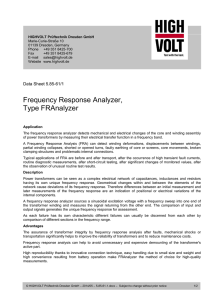
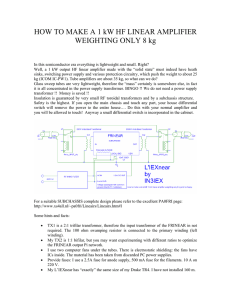
![FORM NO. 157 [See rule 331] COMPANIES ACT. 1956 Members](http://s3.studylib.net/store/data/008659599_1-2c9a22f370f2c285423bce1fc3cf3305-300x300.png)
